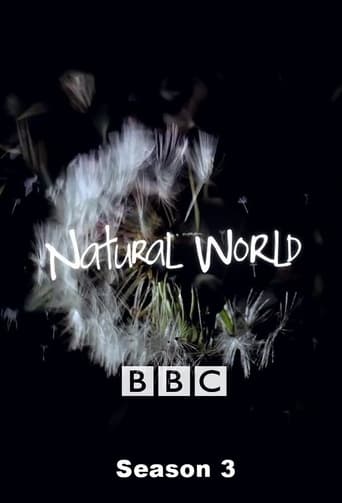Ratings
Series Details
Seasons: 39
Total Episodes: 543
Creators:
Networks: BBC Two
Status: Returning Series
First Air Date: Oct 30, 1983
Recent Air Date: Mar 20, 2020
Run Time: m
In Production: Yes
Original Language: English
Age Rating: TV-G
Website: Link
Production Companies: BBC Studios , BBC Studios Natural History Unit , BBC
Genres
Keywords
People Rated This
None of your friends have rated this title yet
Watch Natural World
Stream Sources
Synopsis
No Synopsis for this season yet
Episodes

Episode 1
04 November 1984 - Among The Wild Chimpanzees
As a child Jane Goodall dreamt of going to Africa and living with the animals. In 1960 her dream became reality: she began a study of chimpanzees in Tanzania's Gombe National Park. Today, more than two decades later, her work still continues, and it has given us a remarkable portrait of the animal most like man. Spanning three generations of chimps, it shows them in all their moods.... playful infants, turbulent adolescents and adults whose behavior ranges from tender motherhood to hunting and even murder.

Episode 2
11 November 1984 - One Man's Island
Documentary programme on Keith Brockle who spent twelve months painting and drawing the bird life on the Isle of May in the Firth of Forth.

Episode 3
18 November 1984 - Invaders Of The Truk Lagoon
Truk Lagoon in the western Pacific is a peaceful tropical atoll. In 1944 its tranquillity was shattered when the US Navy surprised and sank a fleet of 60 Japanese ships. Within 40 years a dazzling array of corals and colorful fish have transformed this sunken arsenal into the world's largest artificial reef.

Episode 4
25 November 1984 - The Desire Of The Moth
The largest known moth in the world has wings the size of a dove, the smallest lives inside a leaf. Although they are creatures of darkness, the bizarre designs and garish colors of moths rival those of butterflies in the hide-and-seek game of life. Among the stories of their double lives are tales of heroes that rescued Queensland from the prickly pear, blizzards of bogongs that were a summer feast for the first Australians, and the story of that irresistible desire that draws the moth to the flame and sudden death.

Episode 5
02 December 1984 - A Question Of Space
Five hundred miles above the parched African landscape a satellite seeks clues to the problem of space on the ground. In Kenya, fueled by a rapidly rising population, the competition for land is threatening one of the wildlife wonders of the world. But the tools to tackle the problem are at hand - ranging from low-tech charcoal-burning stoves to the latest in high-tech space technology. Can solutions be found before the land race gets out of control? Or will the elephant, rhino and zebra lose out in this earthbound battle for space?

Episode 6
09 December 1984 - Peacocks, Parasites And The Puzzle Of Sex
What's the purpose of sex? To protect us from disease! Brian Leith unravels the intricate puzzle of sex and finds that: Males seem to be a waste of time and energy - many of the successful plants and animals (like the weeds in your garden) do without them altogether! Big animals - from polar bears to human beings - always have males as well as females - for a very good reason! The vital clue to the mystery lies in parasitism and infection. Out of the puzzle emerges a sparkling new theory of sex that looks set to keep biologists buzzing for years.

Episode 7
16 December 1984 - Land Of Ice And Fire
The first explorers to penetrate beyond the headwaters of the Missouri brought back tales of a strange land. They spoke of valleys that seemed to smoke and burn perpetually, and of a river that never froze, even in the hardest winter. That land is Yellowstone, America's oldest national park. Two-and-a-half million visitors flock there each summer, but in winter the park takes on another face that most people never see. Bison huddle in the warmth of the hot springs and the steam vents and geysers attain a new beauty in the frozen air.

Episode 8
23 December 1984 - The Lost World Of Medusa
On a remote Pacific island a mysterious lake lies hidden by dense jungle. Below the surface a gigantic shimmering phantom swims, tracking the sun. This weird life form is composed of jellyfish - millions of them - a boiling mass of medusae. Like the other bizarre inhabitants of the lake, imprisonment in this peculiar marine underworld has changed their behavior. But there are other surprises too in this first filmed exploration of the labyrinthine limestone islands of Palau - rain forests sprout from razor-sharp coral rubble; whip scorpions, giant crickets and bats haunt vast caves; and a deep lake pulsates with a strange presence.

Episode 9
06 January 1985 - Kinabalu - Summit Of Borneo
The highest peak in south-east Asia, Kinabalu, was once a mountain of legend and fable. To Chinese adventurers it was the abode of a dragon, rumored to guard a pearl by a lake at the very summit. Today's visitors have yet to find a pearl.... or see a dragon ... but there are riches of another kind. A cool island rearing precipitously from the hot and humid lowlands, Kinabalu is a treasure-house of plant and animal life. Bizarre carnivorous pitcher plants, big enough to drown a rat, share its slopes with huge begonias and stately tree-ferns. Flamboyant rhododendrons shelter the elusive ferret badger as it hunts for giant worms, and there are nearly 1,500 kinds of orchid, many found nowhere else in the world.

Episode 10
13 January 1985 - Wild Ireland
Time, climate and the needs of the Irish have fashioned a magical island. Cast free when the ancient bridge from Britain sank, it still holds within its saucer of ice-scoured rocks the animals and plants that followed the retreat of the glaciers. There are Irish deer, Irish stoats and Irish mountain hares, but no snake ever came to trouble the people who cut the forests, fished and farmed. They invented a land of fairy tales, but there are real mysteries too: a strange meeting of the Arctic and the Mediterranean in a moonscape of white rock called the Burren; the unbroken ebb and flow of wildfowl from this mild winter haven; and the daunting sprawl of the bogs - unbeautiful to some, yet valuable to all, fragile wildernesses in a land wild with change.

Episode 11
20 January 1985 - Water - A Fresh Look
Shooting rapids without a kayak, playing with some hefty manatees and feeding piranhas by hand! These are the extraordinary activities of an ordinary German businessman Walter Sigl , whose modest manner hides a spirit of daring and determination. His objectives: to film in the relatively unfilmed world of fresh water. This he has done with camera equipment which may seem ordinary too, but the results he achieves are a glorious pictorial celebration of the Orinoco river in Venezuela, strange lakes in Germany and crystal-clear springs in Florida.

Episode 12
27 January 1985 - Battle Of The Leaves
Leaves are nature's pacifists -or so it seems. Leaves hang there green and uncomplaining, while animals chew them to death, birds tear them from their stems for nest building, and dusky maidens (it's rumored) roll them on their thighs to provide grandad with a fragrant cigar. But foliage fights back. Leaves struggle for survival in ice and in desert. They battle to the death for life-giving sunlight. Above all, they wage a relentless war against the animals who live on them. Above our heads, beneath our feet, the battle continues....

Episode 13
03 February 1985 - The Year Of The Rat
Rats - should we like them? Some people hate and despise these rodents. As the Chinese Year of the Rat draws to a close, down on the farm the rats' year goes on. Resourceful and adaptable, these successful invaders have enjoyed our unwitting hospitality for over two centuries. But this Jekyll and Hyde of animals challenges our prejudices. Is it not also an attractive pet, and a clever animal; and don't we all owe our lives to the rat as a tool of research into good health? This animal opportunist should be watched - even from behind your chair....

Episode 14
10 February 1985 - Through Animal Eyes
Is your dog color blind? How do cats and owls see so much at night and high-flying kestrels spot tiny mice scuttling in the grass below? Do insects tune in to colors invisible to us? Is a scarlet anorak like a red rag to a bull and can a rattlesnake really see its prey in total darkness? With the help of video techniques and specially-developed cameras, this program sets out to answer these questions and many more and to visualize what the world looks like through the eyes of a wide range of different animals. The results are often surprising.

Episode 15
17 February 1985 - Within A Garden Wall
A Cotswold dry-stone wall, built 400 years ago, is a haven for wildlife. The cracks, crevices and man-made crags of a Cotswold dry-stone wall form one of the harshest places for wildlife to live. There are plants that survive deluge and drought, 'wall-fish' that swim in a bed of slime, and royal households that each year rise to power, decline and die. There are creatures that emerge from the ghostly skins of their former selves, woody stems that keep demons from the door, and lichens, with a calendar spanning the four centuries etched into their patterns, that turn the stone wall into an enchanted wilderness; in all, a remarkable place and probably the most overlooked nature reserve in the world.
Crew
| Department | Role | Name |
|---|---|---|
| Department | Role | Name |

